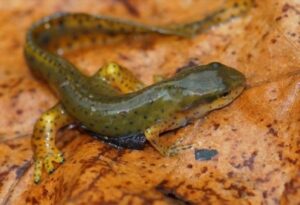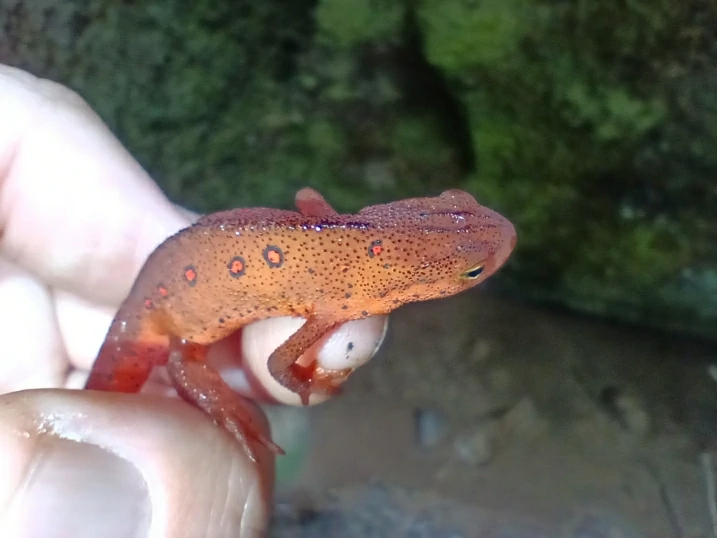You might look at a small, soft-skinned newt and think it looks fragile. Its smooth body and slow steps don’t show toughness.
But then you hear stories of newts living through cold winters, moving from water to land, or even surviving in backyard ponds.
So you wonder: are newts really hardy, or do they need constant care to stay alive?
Newts are hardy because they can adapt to different environments, survive harsh winters, and live long lives with the right care.
Still, their toughness has limits. They’re strong in some ways but sensitive to sudden changes in water, temperature, and handling.
What Does It Mean for a Newt to Be Hardy?
When people call an animal hardy, they usually mean it can handle stress and survive without perfect conditions. For newts, hardiness shows up in their:
-
Ability to live in both land and water
-
Resistance to cold weather in the wild
-
Long lifespan when kept in good conditions
But hardy doesn’t mean invincible. It just means they’ve got natural ways of surviving that make them tougher than they look.
Can Newts Survive Harsh Winters?
Yes, and this is one of the clearest signs of their toughness.
In the wild, many newts live in regions where winter brings freezing temperatures. Instead of dying, they burrow under leaves, logs, or mud and wait it out.

Some species can even survive ice forming around their bodies. Their metabolism slows, movement stops, but life continues inside their cells until spring warmth returns.
This ability makes them much hardier than many animals that can’t handle cold at all.
Do Newts Adapt Well to Captivity?
Newts adapt better to captivity than many exotic pets, as long as their environment is set up right.
Unlike some frogs that need constant misting or very specific humidity, newts are more flexible.
They can live in semi-aquatic tanks with land and water or in fully aquatic setups, depending on the species.
For example, fire-bellied newts often thrive in aquariums with clean, cool water and can live for over a decade in captivity. Their adaptability is one big reason people call them hardy.
How Long Do Newts Live?
Another sign of their toughness is lifespan. With proper care, newts can live 10–20 years, sometimes even longer.

A pet that lives this long shows it’s not fragile when given the right setup. But again, the key is stability.
Sudden drops in water quality, food shortages, or overheating can still cut that life short.
Do Newts Handle Handling Well?
Here’s where their toughness doesn’t hold up.
Newts have delicate skin that absorbs chemicals easily. Soap, lotion, or even natural oils from your hands can harm them.
Too much handling also stresses them, making them sick more easily.
So while they’re hardy against cold, environmental changes, and even long fasting periods, they’re not hardy against human touch. They’re best enjoyed as pets you watch, not ones you pick up often.
How Do Newts Compare to Other Amphibians in Hardiness?
If you compare newts to frogs or salamanders, they often come out tougher.
- Frogs are more sensitive to changes in humidity and often need very controlled terrariums.
- Salamanders can be delicate and harder to keep alive in captivity.
- Newts, by contrast, are more forgiving of small mistakes in setup.
That’s why many people consider them a good choice for first-time amphibian keepers who are willing to learn.
Are Newts Resistant to Illness?
To a point, yes. They don’t get sick easily if their environment is stable. But if the water is dirty or the temperature climbs too high, they can quickly develop infections or stop eating.

So their toughness depends on prevention. Keep their tank clean, feed them properly, and they’ll stay strong.
Ignore those basics, and their toughness won’t save them.
Do Wild Newts Show Their Hardiness Too?
Absolutely. Watch a pond in spring and you’ll see newts swimming around after months of winter cold.
Some species live in garden ponds without extra care, hiding under rocks or logs and coming back each year.
This natural resilience shows why they’ve survived for millions of years across Europe, Asia, and North America.
They’re hardy enough to live alongside changing seasons and predators.
Why Hardy Doesn’t Mean Easy
It’s important to remember: hardy doesn’t mean low-maintenance.
A newt can survive cold winters, but in a warm house it still needs cool water.
It can adapt to different foods, but it still needs a steady supply of worms or frozen insects.
So while they’re hardy compared to many exotic pets, they still need care and consistency.
Conclusion
So, are newts hardy?
Yes, they can handle cold winters, adapt to captivity, and live surprisingly long lives. They’re tougher than their soft bodies suggest, especially in the wild. But they’re not invincible.
They’re sensitive to poor water quality, handling, and overheating.
The truth is this: newts are hardy survivors of nature, but in your care, they still depend on you to keep their small world stable.
Hi, my name is Ezra Mushala, i have been interested animals all my life. I am the main author and editor here at snakeinformer.com.

